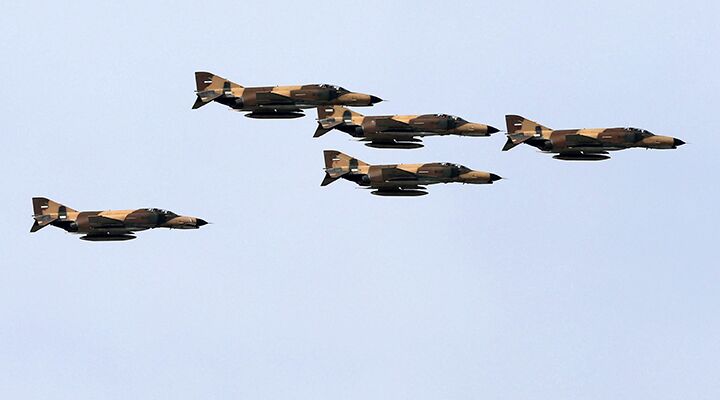
Iran Air Strikes: A Dramatic Change in Tactics
Late November bore witness to a dramatic and ominous change in Middle East geopolitics. On November 30, Al Jazeera aired video footage purportedly showing Iranian jets conducting airstrikes over Iraq. Pentagon officials stated that they had no reason to doubt the images.
Iran allegedly struck Islamic State targets in the Iraqi province of Diyala. This province has seen the closest fighting to the Iranian border, and is covered in part by Iran’s self-proclaimed buffer zone. Iran’s aging F-4 Phantom fleet carried out the raids. These American-built planes come from the days of the shah of Iran, when the country was one of the U.S.’s closest allies in the region.
Now these planes fly openly in Iraqi skies, showing that Iran is moving beyond its usual tactics.
For decades now, Iran has worked from the shadows. It backs Hezbollah in Lebanon and Bashar Assad’s regime in Syria. In Yemen, the Houthis are armed by Iran. Bahrain’s riots are stoked by Iranian protesters. All across the Middle East, Iran’s instigating presence can be felt. But Tehran has used subterfuge and proxy wars, keeping its activities quiet and at arm’s length, giving itself a degree of plausible deniability for its involvement.
What is happening in Iraq today is something different. Iran’s campaign in Iraq has been anything but covert. Tehran has done little to hide that its Revolutionary Guard Corps are working alongside Iraqi soldiers. It has also made no bones about arming Shia militias within the nation. Under the guise of stemming the march of the Islamic State, Iran now wages open military missions within Iraq.
Then there is Iran’s Gen. Qassem Suleimani. The mysterious general is responsible for orchestrating numerous attacks on U.S. military targets, as well as overseeing Iran’s role in Lebanon and Syria. Until recently, the man had been little more than a ghost. Today, however, he is living larger than life in Iraq. Suleimani has been seen leading troops in eastern Iraq, and has already gained a string of victories against Islamic State forces.
Following closely on Suleimani’s heels has been the airstrikes on Islamic State targets. Put these developments together and you clearly see the dramatic change in Iran’s tactics. Iran is fighting in the clear light of day.
Even more remarkably, the United States has endorsed Iran’s aggressive military campaign within Iraq. Secretary of State John Kerry called Iran’s actions “positive,” saying that if Iran was targeting Islamic State and having an impact, it was a good thing. If Iran needed Washington’s stamp of approval, it got it.
Such an endorsement cements the effect of this policy change on the Middle East. A nation with an aggressive foreign policy being given the nod of approval by the U.S. is certain to have an impact on other nations in the region.
Consider Saudi Arabia. The Saudis are the key regional counterweight to Iran. The two nations wage proxy wars against one another throughout the region. The Saudis are putting out fires all along their southern and eastern borders as Iran stirs up unrest in neighboring nations. Now they are faced with Iran’s air force operating next door in Iraq.
Iran has one of the largest standing armies in the region with about 545,000 active personnel. It is an aggressive nation; it is the world number one state sponsor of terror. Its desire to dominate the region is no secret. Look at its already vast area of influence. It is working to establish control through weakening and destabilizing other nations. Now that it has been unofficially approved to have a military presence in Iraq, what will its next frontier be?
And once there are troops in Iraq, where else will Iran look? Will it offer military support in other unstable regions where other Shiites are threatened? Syria? Lebanon? Yemen? Bahrain? This is the threat now posed by Iran. The Iranian military is no longer fighting cloak-and-dagger—it is fighting out in the open.
Watch Iran make the most of this opportunity to grow its presence in the Middle East. Iran has pushed the boundaries of its influence, and it has received America’s endorsement. Watch Iran try again, pushing further to dominate the region. But also be aware of where this pushy foreign policy will lead.
Bible prophecy indicates that Iran’s policy of pushing at other nations will not be wholeheartedly endorsed for long. Iran, as the Trumpet has often pointed out, is the prophesied king of the south. (See our article “Three Reasons Why Iran Is the ‘King of the South’ of Bible Prophecy.”) In Daniel 11, this king is prophesied to push one too many times, bringing on a horrifying backlash from another rising world power.
Read Trumpet editor in chief Gerald Flurry’s article “The Whirlwind Prophecy,” and you will see that Iran’s military expansion in the region won’t go unchecked. Iran is growing bolder, changing its tactics and pushing harder than ever. How long will this continue before Daniel 11:40 is fulfilled?
